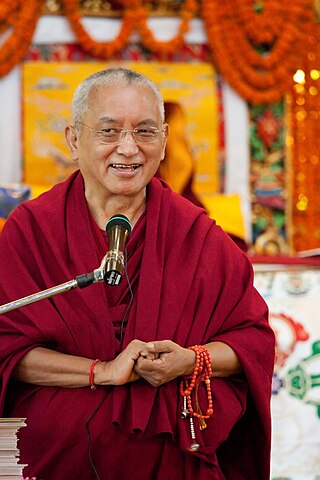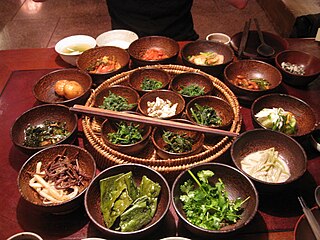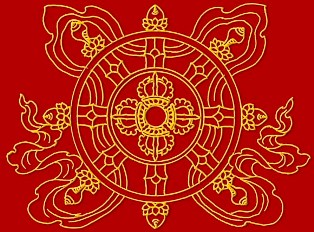There are currently two, separately enthroned 17th Gyalwang Karmapas: Ogyen Trinley Dorje and Trinley Thaye Dorje. The Karmapa is the spiritual leader of the nine-hundred-year-old Karma Kagyu lineage of the Kagyu school of Tibetan Buddhism.
The Dorje Shugden controversy is a controversy over Dorje Shugden, also known as Dolgyal, whom some consider to be one of several protectors of the Gelug school, the school of Tibetan Buddhism to which the Dalai Lamas belong. Dorje Shugden has become the symbolic focal point of a conflict over the "purity" of the Gelug school and the inclusion of non-Gelug teachings, especially Nyingma ones.

Thubten Zopa Rinpoche was a Tibetan Buddhist lama in the Gelug school. He is known for founding the Foundation for the Preservation of the Mahayana Tradition and Maitripa College in Portland, Oregon.

Sogyal Rinpoche was a Tibetan Dzogchen lama. He was recognized as the incarnation of a Tibetan master and visionary saint of the 19th century, Tertön Sogyal Lerab Lingpa. Sogyal Rinpoche was the founder and former spiritual director of Rigpa — an international network of over 100 Buddhist centres and groups in 23 countries around the world — and the author of the best-selling book The Tibetan Book of Living and Dying, which has been printed in 30 languages and 56 countries. Before his retirement, in the wake of abuse allegations in 2017, he had been teaching for 40 years in Europe, America, Asia and Australia.

Buddhist vegetarianism is the practice of vegetarianism by significant portions of Mahayana Buddhist monastics and laypersons as well as some Buddhists of other sects. In Buddhism, the views on vegetarianism vary between different schools of thought. The Mahayana schools generally recommend a vegetarian diet, claiming that Gautama Buddha set forth in some of the sutras that his followers must not eat the flesh of any sentient being.

Buddhism is an ancient Indian religion, which arose in and around the ancient Kingdom of Magadha. It is based on the teachings of Gautama Buddha, who lived in the 6th or 5th century BCE and was deemed a "Buddha". However, Buddhist doctrine holds that there were other Buddhas before him. Buddhism spread outside of Magadha starting in the Buddha's lifetime.

Women in Buddhism is a topic that can be approached from varied perspectives including those of theology, history, anthropology, and feminism. Topical interests include the theological status of women, the treatment of women in Buddhist societies at home and in public, the history of women in Buddhism, and a comparison of the experiences of women across different forms of Buddhism. As in other religions, the experiences of Buddhist women have varied considerably.

Glenn H. Mullin is a Tibetologist, Buddhist writer, translator of classical Tibetan literature and teacher of Tantric Buddhist meditation.

In Tibetan Buddhism, the Three Jewels and Three Roots are supports in which a Buddhist takes refuge by means of a prayer or recitation at the beginning of the day or of a practice session. The Three Jewels are the first and the Three Roots are the second set of three Tibetan Buddhist refuge formulations, the Outer, Inner and Secret forms of the Three Jewels. The 'Outer' form is the 'Triple Gem', the 'Inner' is the Three Roots and the 'Secret' form is the 'Three Bodies' or trikāya of a Buddha.

Sravasti Abbey, the first Tibetan Buddhist monastery for Western nuns and monks in the U.S., was established in Washington State by Bhikshuni Thubten Chodron in 2003. Whilst practicing in the Tibetan Buddhist Tradition, Sravasti Abbey monastics ordain in the Dharmaguptaka Vinaya. It is situated on 300 acres (1.2 km2) of forest and meadows, 11 miles (18 km) outside of Newport, Washington, near the Idaho state line. It is open to visitors who want to learn about community life in a Tibetan Buddhist monastic setting.

Ven. Thich Nhat Tu or Thích Nhật Từ (釋日慈) in Vietnamese is a Vietnamese Buddhist reformer, an author, a poet, a psychological consultant, and an active social activist in Vietnam. He is committed to propagate Buddha's teachings through education, cultural activities and charitable programs in order to benefit the individuals and the society at large.

The 14th Dalai Lama, Tenzin Gyatso, full spiritual name: Jetsun Jamphel Ngawang Lobsang Yeshe Tenzin Gyatso, also known as Tenzin Gyatso; né Lhamo Thondup; was born on the 5th day of the 5th month in the Wood-Pig Year of the Tibetan lunar calendar, July 6, 1935 in the Gregorian calendar. The incumbent Dalai Lama is the highest spiritual leader and head of Tibetan Buddhism. Before 1959, he served as both the resident spiritual and temporal leader of Tibet, and subsequently established and led the Tibetan government in exile represented by the Central Tibetan Administration in Dharamsala, India. The adherents of Tibetan Buddhism consider the Dalai Lama a living Bodhisattva, specifically an emanation of Avalokiteśvara or Chenrezig, the Bodhisattva of Compassion, a belief central to the Tibetan Buddhist tradition and the institution of the Dalai Lama. The Dalai Lama, whose name means Ocean of Wisdom, is known to Tibetans as Gyalwa Rinpoche, The Precious Jewel-like Buddha-Master, Kundun, The Presence, and Yizhin Norbu, The Wish-Fulfilling Gem. His devotees, as well as much of the Western world, often call him His Holiness the Dalai Lama, the style employed on his website. He is also the leader and a monk of the Gelug school, the newest school of Tibetan Buddhism, formally headed by the Ganden Tripa.
In the Buddha's first discourse, he identifies craving (tanha) as the cause of suffering (dukkha). He then identifies three objects of craving: the craving for existence; the craving for non-existence and the craving for sense pleasures (kama). Kama is identified as one of five hindrances to the attainment of jhana according to the Buddha's teaching. Throughout the Sutta Pitaka the Buddha often compares sexual pleasure to arrows or darts. So in the Kama Sutta (4.1) from the Sutta Nipata the Buddha explains that craving sexual pleasure is a cause of suffering.
If one, longing for sensual pleasure, achieves it, yes, he's enraptured at heart. The mortal gets what he wants. But if for that person — longing, desiring — the pleasures diminish, he's shattered, as if shot with an arrow.

Buddhism is a religion and philosophy encompassing a variety of traditions, beliefs and practices, largely based on teachings attributed to Siddhartha Gautama, commonly known as the Buddha, "the awakened one".

A bhikkhunī or bhikṣuṇī is a Buddhist nun, fully ordained female in Buddhist monasticism. Bhikkhunis live by the Vinaya, a set of either 311 Theravada, 348 Dharmaguptaka, or 364 Mulasarvastivada school rules. Until recently, the lineages of female monastics only remained in Mahayana Buddhism and thus were prevalent in countries such as China, Korea, Taiwan, Japan, and Vietnam, while a few women have taken the full monastic vows in the Theravada and Vajrayana schools. The official lineage of Tibetan Buddhist bhikkhunis recommenced on 23 June 2022 in Bhutan when 144 nuns, most of them Butanese, were fully ordained.

Narendra Modi, who is serving the Prime minister of India since 2014. The following is a timeline of the premiership from his inauguration as Prime Minister of India on 26 May 2014 till now.
Buddhism in Hungary has existed since 1951 when Ernő Hetényi founded the Buddhist Mission in Germany, as a member of the Arya Maitreya Mandala Buddhist order. However, the first Buddhist community had been founded in the 1890s in Máramarossziget. József Hollósy took refuge and wrote Buddhista Kátét (1893) — the first Buddhist catechism in Hungarian. According to this, the Dharma has been present in Hungary for more than a century. In 1933 the Hungarian philologist and Orientalist — author of the first Tibetan-English dictionary and grammar book Sándor Kőrösi Csoma — was recognised as a bodhisattva in Japan. In Hungary József Hollósy is regarded as the second bodhisattva.
The relationship between Buddhism and democracy has a long history with some scholars claiming the very foundations of Buddhist society were democratic. Though some historic Buddhist societies have been categorized as feudalistic, the relationship between peasants and land owners was often voluntary. Free-thinking Buddhist societies supported autonomy; peasants had mobility and could own land themselves.














